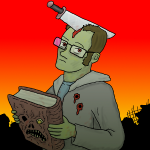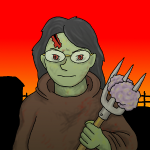zombies
I recently picked up a copy of adventurer and anthropologist William Seabrook's 1929 book on Haitian Voodoo, The Magic Island. The book is out of print, so I thought it would be nice to share some of the wonderful spooky illustrations that accompany the text.
See the whole lot on Flickr
(My HP Photosmart C4180 scanner is a piece of crap, sorry, if there's enough interest I'll rescan these at higher quality.)
In my last zombie post, I looked at a human moving in a circle to avoid a zombie (if they are stuck in a room). What if I build a zombie evading robot that always moves perpendicular to the path of the zombie? Would this work?
This shouldn't be too difficult to model. I can use my existing model for the zombie (where there is a force towards the human and a drag force). For the right-turning-robot, I will also have a drag force and a "driving" force. How do I find the direction of the driving force for the robot? Here is a diagram.
This Fdrive force will really be the frictional force…
And while you're doing that, I have answered the Monday Mystery back at my tried and true wordpress blog.
I will be blogging at the old digs for the next few days until I have had time to digest the unfortunate recent events here at Scienceblogs. What's going on? I'll let my excellent sciblings explain:
GrrlScientist
Mark Chu-Carroll
Thoughtful Animal
PalMD
Dr. Free-Ride
***update and clarification*** I have reached no decision about the future location of Myrmecos blog.
I like some things about Scienceblogs. Their openness in letting bloggers air this sort of dirty laundry out in public…
Ok, ok, this is the last zombie post, I promise.
Here are some exmples of my favourite OTT, badass, crazy zombie fiction!
The Book of the Dead is a classic collection of short stories that's well worth reading.
Monster Island: A Zombie Novel is the first in a trilogy. It's one of those trilogies with significantly diminishing returns as it goes on, but the first book is great.
The Rising is well done and creepy.
Patient Zero: A Joe Ledger Novel by Jonathan Maberry is top notch, the best horror/sf/technothriller I've read in a long time.
Pet Sematary is one of Stephen King's best novels,…
Before Zombie Day comes to a close, I want to do a little braaaaaaaaaaain dump on where zombies actually fit into the scientific landscape (and to thank Joseph Hewitt for the amazing art he provided for all of us. As a huge Evil Dead fan, I especially appreciate my copy of the Necronomicon. Groovy.)
My colleague Lee Billings, with whom I have killed literally tens of thousands of zombies, and I started the day with a discussion of the connection between zombies and science, which took us to the roots of modern-day zombie-dom. It seems pretty clear that word and the basic concept comes from…
I've just gotten back from a conference, and I was blaming the travel and time zones for the fact that I feel like this:
However, from the looks of things, it seems there is some kind of zombie epidemic on ScienceBlogs today. (I suppose this means I need to talk to the IT guys about internet security issues, if I got zombified through my browsing. Assuming they're still taking help tickets from zombies. I wonder if being a zombie with tenure makes a difference ...)
Anyway, in the meantime I thought it might be useful to break out the workplace safety talk for new students. While I can't…
Late Wednesday evening, a terrible disaster began to unfold in the ScienceBlogs universe: word emerged that a zombie attack was taking place in our bloggers' homes. While the attack was believed to have begun somewhere in the southeastern United States, with patient zero Scicurious, it has now spread across the continent and even as far as Martin Rundkvist in Sweden. But even while in pursuit of human brains, the zombies are still dedicated to the mission of communicating science—in this case, getting the word out about the real science of zombiekind. To read up on how zombie epidemics spread…
Forensic entomologists, of course.
These are the strong-stomached folks who study the arthropod fauna that colonizes dead flesh. Their knowledge of insect taxonomy, ecology, and development can be used to provide estimates of the time and conditions of death. Or zombification, in the present case.
Hypothetically, suppose a zombie shuffles along to my house at horrifying rate of 1 km/hr.
On arrival, I note that the zombie is infested with final instar larvae of the blow fly Phormia regina. Under our current warm summer weather conditions, it takes at least 5 days for the maggots to reach that…
My first reaction to the papier du jour among climate communications activists was "meh." It's not that Chris Mooney's latest ruminations on the gap between what the public thinks about scientific issues and what scientists have to say isn't worth reading. It's just that we've been down this road so many times now, the standards of what passes for new and remarkable are getting rather high.
That didn't stop Andy Revkin, Joe Romm, and Evil Monkey from posting lengthy and hard-hitting responses, though. So I gave it a second look, and I've now concluded that "Do Scientists Understand the Public…
I woke up to the shocking discovery that I've been turned into some sort of Zombie:
The great thing is, I seem to attract more ants this way. With any luck I'll get silphids, too.
(artwork by Joseph Hewitt, creator of Gearhead)
It's Zombie Day on ScienceBlogs! Scicurious at Neurotopia kicked things off, and Joseph of Ataraxia Theatre (whose other projects include the GearHead roleplaying game) provided the cool zombie illustrations.
Thanks to the DC Department of Health's excellent disease surveillance system, a recent outbreak of zombies in the nation's capital was detected quickly enough to allow for capture and isolation of all cases, and no further transmission of the zombie virus has been observed. All state and local health and law enforcement departments have been alerted to the outbreak and instructed on…
(from here)
Now, by 'zombie bank', you probably think I'm referring to banks that have more liabilities than assets, and are basically waiting for the plug to be pulled. Nope. At this point, the only rational explanation for many banks' behavior is that they have actually been taken over by zombies.
Consider the following:
1) Banks have been acting as if they are brain dead. Maybe they are brain dead.
(from here)
2) Banks are behaving voraciously towards their customers, showing very poor impulse control. Sounds like zombies to me.
3) Banks are set in their ways, and reacting very…
In the spirit of helping my readers increase their preparedness, I thought I'd remind you that you have 0 more days before Zombie Day to shop and get ready for Zombie attacks. So just in case there are zombies coming down your pike, and you aren't ready, I offer a reprint of a piece I wrote about what to do if you haven't been preparing or storing food, water or medicines (as everyone from FEMA to the American Red Cross advises every citizen to do). Crisis shopping is really not the way to do this - you are better off making preparations in advance, but just in case you have been ignoring…
(Awesome image of zombie me by Joseph Hewitt of Ataraxia Theatre and the originator of the cool RPG Gearhead Check out my fellow bloggers to see their zombie pix! I wonder if New Society would let me use this as my book jacket photo for the new book?)
As all of you obviously know, July 1 is International Zombie Day - celebrated around the world by the zombifying oneself, posting brain recipes, strategies for fightin' em off, etc... Well, ok, it is kind of a new, science-blogs-only-holiday so far (credit for the idea goes to Scicurious!), but following the stunning success of international…
As a dedicated chemistry nut - I mean, of course, enthusiast - I've recently wondered if my favorite science could explain the existence of zombies.
And after mulling it over - helped along by the suggestion of Scibling Scicurious that a Zombie Day would be a good idea and also by a number of cocktails from the home speakeasy, I believe I've come up with a very reasonable theory.
1. The poisonous element arsenic (As) is famed for its ability to make a dead person look, well, undead.
2. Why? Arsenic helps preserve soft tissues, partly by interfering with the ability of bacteria…
Wasps, hornets, and other Hymenoptera may live nearly solitary lives, live in huge colonies, or something in between. The European hornet, Vespa crabro, lives in a colony consisting of one queen mated to a single male. In Hymenoptera, females are typically diploid (having genes from both parents) while males are typically haploid (having genes only from the female parent). If you draw a diagram of this and stare at it for a long time, you may come to the same conclusions that Bill "Buzz Off" Hamilton came to several years ago. A female would benefit genetically from helping her mother…
To celebrate Zombie Day at ScienceBlogs, I'm pleased to reveal a short excerpt from my forthcoming book Zombology: the new science of reanimation and mind control. I hope you enjoy it!
"Go, my dear Ernst," she said very gently; "go, and forget me. You might as well love a buried corpse as love a woman with such a fate as mine.""My love should have the power to magnetise the corpse into fresh life!"--Ouida, The Massarenes
Death has always been seen as a permanent barrier that only the most divine could cross at will. For the rest of us mortals, it was intended to be a one-way trip, and…
Damn, I wish I'd written this! John Michael Greer takes up the Victory Garden, and puts it in its proper place - economically, politically, socially - and for zombie slaying. What's not to love? And I think he has it pretty much exactly right here - that while growing your own is never the solution to all problems, it often does mediate our potential suffering - which is why as long as there has been modernity it has been a solution to its difficulties. (Before the Victory Garden movement, there was the British cottage garden movement, a direct response to the disruptions of early…
A while back I ran a post-apocalyptic novel book club on ye olde blogge, which was a lot of fun. It allowed us to get our doom on at low stakes. Now I'm not, strictly speaking, a hard doomer. I suspect most of the likely scenarios involve gradual declines in resource availability and increasing poverty. In some ways this is more depressing than the grand and more dramatic scenarios that writers love to create - you can win against the zombies, but it is tough to win against the enemy "crushing national debt and gradually increasing world temperatures."
I think most apocalyptic novels are…
This fantastic slice of art just arrived from Paradigma, who are publishing the Dutch translation of my forthcoming book Zombology. Awesome! I better get writing some words to go with it.






